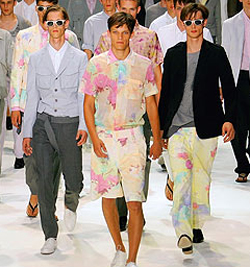 |
Feminism
Liberated Women Are Unhappy
Are You Surprised?
Margaret C. Galitzin
Last week I was invited to visit the capital city of a virtually unknown country called Lapland. It was a quite pleasant city with temperate climate, no mosquitoes and a low crime rate. The people, however, were a bit different.

The men of Lapland had adopted feminine colors and clothing; boys filled the ballet classes
 |
The men of that country were following a popular fashion that had taken hold in the country some 40 years ago whereby they tried to appear more delicate and feminine. Lapland’s media and propaganda machines were clearly behind the trend: Men’s clothing in pastels and paisley prints followed the soft, flowing lines of women’s dress.
Men’s knitting and quilt-making groups proliferated. One newscaster proudly announced that typically female occupations were now dominated by men: fully 85% of all manicurists, hairdressers, nannies, seamstresses and house-cleaners were men. Ballet classes were also filled with boys and men.
The calm atmosphere of the city presented an idyllic scenario filled with pacific, domesticated men. Nonetheless, I came to find out, the men were not happy. Polls showed that, despite the fad for men to eschew their masculine traits and embrace feminine characteristics, these men were discontent. The Lapland men were depressed, seeking psychiatric treatment, and generally dissatisfied with life.
Why is this not surprising? When men deny their nature and try to be what they are not, we find the expected consequence: frustration, mental imbalances, dissatisfaction and unhappiness.
Now, when I apply my experience in Lapland to the United States, I see that it is not much different insofar as we change the genders – instead of men taking the place of women, here women are taking the place of men.
Indeed, for the last half century, women in this country have been swallowing the myths of Feminism – that they should act and dress like men, leave the home and enter the business world, take up professional jobs, compete in sports – and everything else in the “man’s world.”
The quest to be like men and attain equality in every sphere would make women happier and more fulfilled. This was the general assumption behind the myth. And so women became policemen and entered the armed forces. They became truck, bus and taxi drivers. They flowed into the law, medical and engineer schools and filled the desks in business offices. They entered the world of finance, becoming bank managers, stock brokers, and investment planners. They practice manly sports such as basketball, soccer and even martial arts and boxing. They became financially independent, “sexually liberated” and psychologically free.

Women have entered the army and become stock brokers - but they are unhappy
 |
According to all the propaganda we have been bombarded with during the last 40 years, women should be happy, right? Wrong. Two reports have recently presented results showing that women have become steadily more miserable since 1972. It seems Feminism has not paved out the way so many women thought it would.
One study, “The Paradox of Declining Female Happiness,” was undertaken by economists Betsey Stevenson and Justin Wolfers. They duly note that American women are more like men than they were 40 years ago: They work outside the home, go to college, control their fertility and play professional sports. Notwithstanding, the so-called achievements of the feminist era have delivered women to greater unhappiness.
In the 1960s, American women reported themselves happier, on average, than did men. Today, women's happiness has declined both absolutely and relatively to men. (1).
The second report was a special poll conducted by the Rockefeller Foundation and Time magazine. Comparing today’s findings to a similar poll on the state of American women undertaken in 1972, we are told that 40 years ago, 1/3 of women were workers – now almost half are. They constitute 57% of college students. Women make up 15% of the army – up from 2% in 1972. Today they are represented in the Cabinet, the legislature and Supreme Court. (2)
There are also statistics showing other negative consequences of Feminism: In the 1970s most children grew up with a stay-at-home mother; now about 30% do. Today 39% of all births are to unmarried mothers, compared with 12% in 1972; thanks to this phenomenon as well as the devastation wreaked by divorce, 23% of children live with a single mother. Further, although more women work outside the home, they continue to be primarily responsible for taking care of the children and work inside the home. (3)
The Time report concludes that American 2009 liberated women are definitely more powerful – but also unquestionably less happy.
Are you surprised? For me, the surprise was not that women today are unhappier. Anyone with open eyes can see this in day-to-day life and in talking with modern women. What is new is that credible, large-scale studies are actually reporting the fact. Up until now, this truth has been carefully covered to promote Feminism. It is a hopeful sign to watch whether this fog will begin to lift.
Like the men in Lapland, the modern women who have been following the fashion of Feminism these last few decades have been deceived by its lies. A woman was not made to be like a man; she was made to be his helpmate. She has her own nature and vocation of motherhood that God gave specially to her. If she goes against their nature, she will not become like men. She will lose her delicacy, dignity and self-respect. She will become an unhappy, dissatisfied and frustrated woman.
1. The Paradox of Declining Female Happiness, online edition
2. "The State of the American Woman," TIME magazine, October 26, 2009, pp. 24-33.
3. Ibid.

Posted October 28, 2009

Related Topics of Interest
 Ratzinger on Feminism Ratzinger on Feminism
 The Vatican's Feminism The Vatican's Feminism
 The Role of Authority in the Family The Role of Authority in the Family
 Women in Sports Women in Sports
 Should Wives Obey Husbands? Should Wives Obey Husbands?
 Nuns Dance at an Official Conference Nuns Dance at an Official Conference
 Life and Death of Katherine Hepburn Life and Death of Katherine Hepburn
 Women in the Middle Ages Women in the Middle Ages

Related Works of Interest
|
|
Feminism | Hot Topics | Home | Books | CDs | Search | Contact Us | Donate

© 2002-
Tradition in Action, Inc. All Rights Reserved
|
 |

|